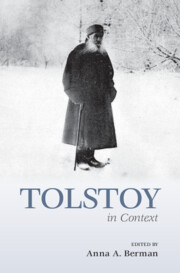Book contents
- Tolstoy in Context
- Tolstoy in Context
- Copyright page
- Contents
- Figures
- Notes on Contributors
- Preface
- Acknowledgments
- Note on Citations, Translations, and Transliterations
- Chronology
- Part I The Man
- Part II Russian Social and Political Contexts
- Part III Literature, the Arts, and Intellectual Life
- Chapter 16 Tolstoy’s Oeuvre
- Chapter 17 Peasant Schools and Education
- Chapter 18 Russian Philosophy
- Chapter 19 The Russian Literary Scene
- Chapter 20 European Literature
- Chapter 21 European Philosophy
- Chapter 22 Theater
- Chapter 23 Music
- Chapter 24 The Visual Arts
- Part IV Science and Technology
- Part V Beyond Russia
- Part VI Tolstoy’s Afterlife
- Suggested Further Reading
- Index
Chapter 22 - Theater
from Part III - Literature, the Arts, and Intellectual Life
Published online by Cambridge University Press: 05 January 2023
- Tolstoy in Context
- Tolstoy in Context
- Copyright page
- Contents
- Figures
- Notes on Contributors
- Preface
- Acknowledgments
- Note on Citations, Translations, and Transliterations
- Chronology
- Part I The Man
- Part II Russian Social and Political Contexts
- Part III Literature, the Arts, and Intellectual Life
- Chapter 16 Tolstoy’s Oeuvre
- Chapter 17 Peasant Schools and Education
- Chapter 18 Russian Philosophy
- Chapter 19 The Russian Literary Scene
- Chapter 20 European Literature
- Chapter 21 European Philosophy
- Chapter 22 Theater
- Chapter 23 Music
- Chapter 24 The Visual Arts
- Part IV Science and Technology
- Part V Beyond Russia
- Part VI Tolstoy’s Afterlife
- Suggested Further Reading
- Index
Summary
Tolstoy’s relationship with staged art was anxious and passionate. He was not a man of the theater – of the performing arts, music was his passion – and he was highly critical of many playwrights, such as Shakespeare and Chekhov, whom he felt abused the medium. And yet he authored several powerfully effective dramas (comedies and tragedies) as well as numerous experimental dramatized folktales and parables, and even a quasi-fictive version of his own diaries in dramatic form titled A Light Shines in the Darkness. Tolstoy composed theatrical works in two distinct periods, early and late, on either side of his spiritual turning point. This essay discusses the major plays and one exemplary didactic folk miniature (The First Distiller, 1886) in the context of nineteenth-century Russian theatrical resources, official censorship, and Tolstoy’s own evolving sense of theater’s “infectiousness” as an instrument of communication and moral growth, moving from the unsuccessful farce The Infected Family (1863) through The Power of Darkness (1886), The Fruits of Enlightenment (1889), and The Living Corpse (1900). On the stage as in his prose, Tolstoy emerges as a “realist” only in the most superficial sense. In both venues he is a rebel.
Keywords
Information
- Type
- Chapter
- Information
- Tolstoy in Context , pp. 178 - 186Publisher: Cambridge University PressPrint publication year: 2022
